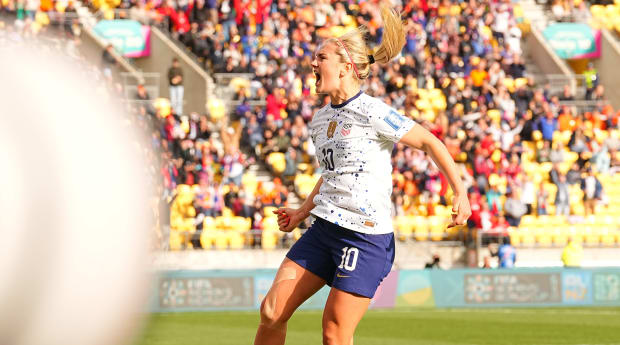The sequence changed the game, and it could come to epitomize this team. The Netherlands’ Daniëlle van de Donk knocked down the U.S.'s Lindsey Horan. Horan was most displeased. They jawed at each other. The fact that van de Donk and Horan are club teammates for Lyon was either irrelevant or especially relevant; they would have to say how they truly feel about each other. It was so testy that the ref tried to negotiate some sort of truce. Well, world peace has to start somewhere. But not there, not then. Horan did not go all the way to Wellington, New Zealand, to make peace.
Horan scored moments later on a header off a Rose Lavelle corner kick. The Americans had tied the Dutch, 1–1.
“She gets fouled, kicked, hurt,” U.S. coach Vlatko Andonovski told the media in New Zealand afterward. “It’s a very difficult moment. Instead of crying about it, she just goes and makes a statement and shows everyone the direction the game is going to take.”
The score would hold. The 1–1 draw ended the USWNT’s 13-game World Cup winning streak, and yet in some ways this felt like a win for the Americans.

Erick W. Rasco/Sports Illustrated
There were a couple of reasons for that. The most obvious is that the U.S. had such a dispiriting first half. After the Netherlands took an early 1–0 lead, the Americans wobbled for a long stretch.
“The thing that did not work at parts of the first half … we allowed them to take control of the tempo and slow down the tempo a lot more than we wanted,” Andonovski said.
A loss almost certainly would have left the Americans needing a win against Portugal just to finish second in its group, behind the Netherlands, and in danger of missing the knockout stage. Instead, the U.S. salvaged a tie, is very likely to advance and has a chance to win its group.
Another reason this game felt a bit like a U.S. win immediately afterward is how well the Americans played in the second half. One characteristic of this team is that at some point in a game, it tends to confirm whatever your preconceived notions were. If you question the coaching, believe in the young stars, trust the veterans or think injuries are too much to overcome, some portion of the game will confirm that for you. Andonovski came into the game believing that what his team needs, more than anything, is to keep playing together. This game confirmed that for him.
“They grew throughout the game—individually, but also as a team,” Andonovski said. “This team is not just young. This team is a fresh team, a team that has not spent a lot of minutes together. We’re going to get better from game to game and we’re going to be a lot more efficient as well.”
It was hard to share that belief in, say, the 40th minute. But Andonovski did not panic. He made one substitution at halftime—inserting Lavelle, who didn’t start because she was on a minutes restriction, for Savannah DeMelo. The U.S. played well enough in the second half that, if you went into this tournament believing that the Americans will win their third straight World Cup, you can hold on to that belief.
“The baseline is the second half of this game,” Andonovski said. “We’re playing good opponents. It’s not like they’re going to stand there and allow us to do what we want to do. There will be a dip in the rhythm, which is O.K. How do we get out of those dips? If it’s 60 minutes [of strong play], how do we make it 75 minutes?”
The Americans can probably beat Portugal with 60 minutes of strong play. But to win the group, they need to win and hang on to their goal-differential lead. (The U.S. has a two-goal advantage, but the Netherlands could change that with a blowout win over Vietnam.) Lindsey Horan got knocked down and responded with a fury. So did her team. Their coach thinks they are finding themselves. The rest of this World Cup hinges on his being correct.







